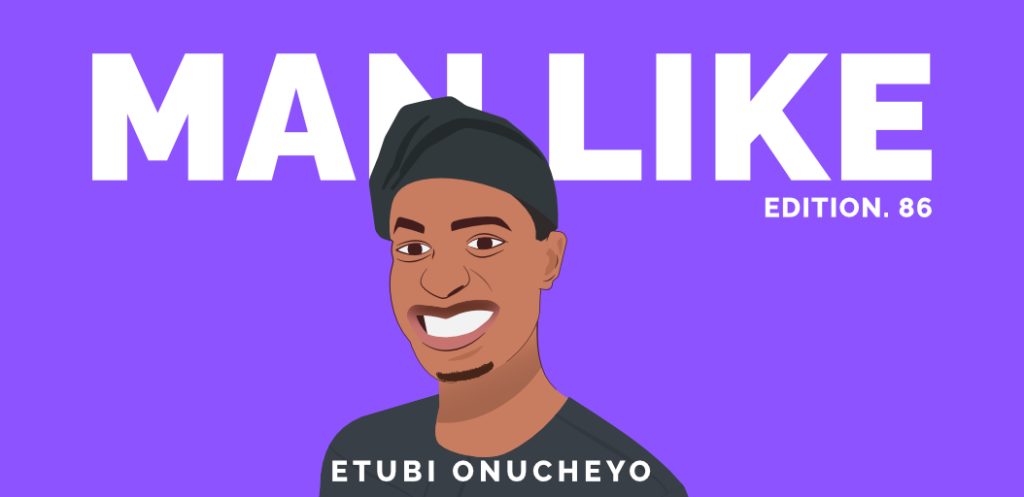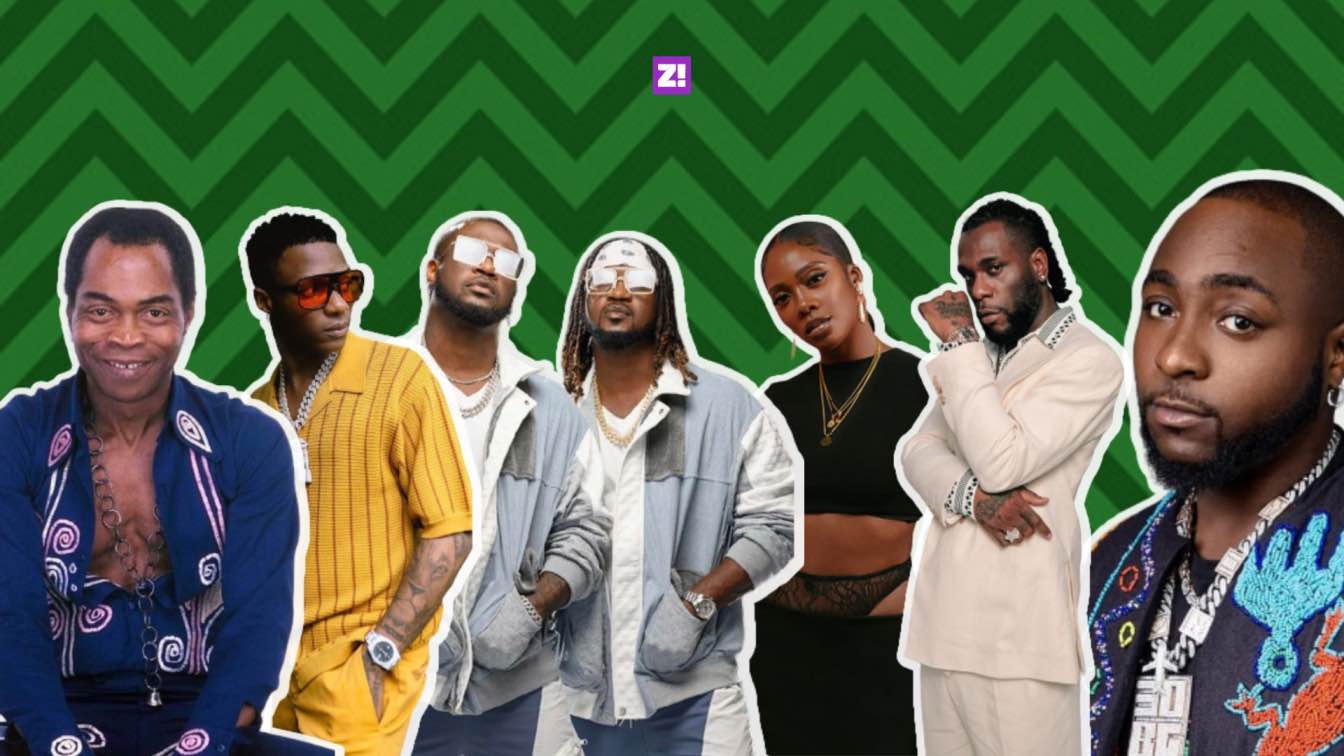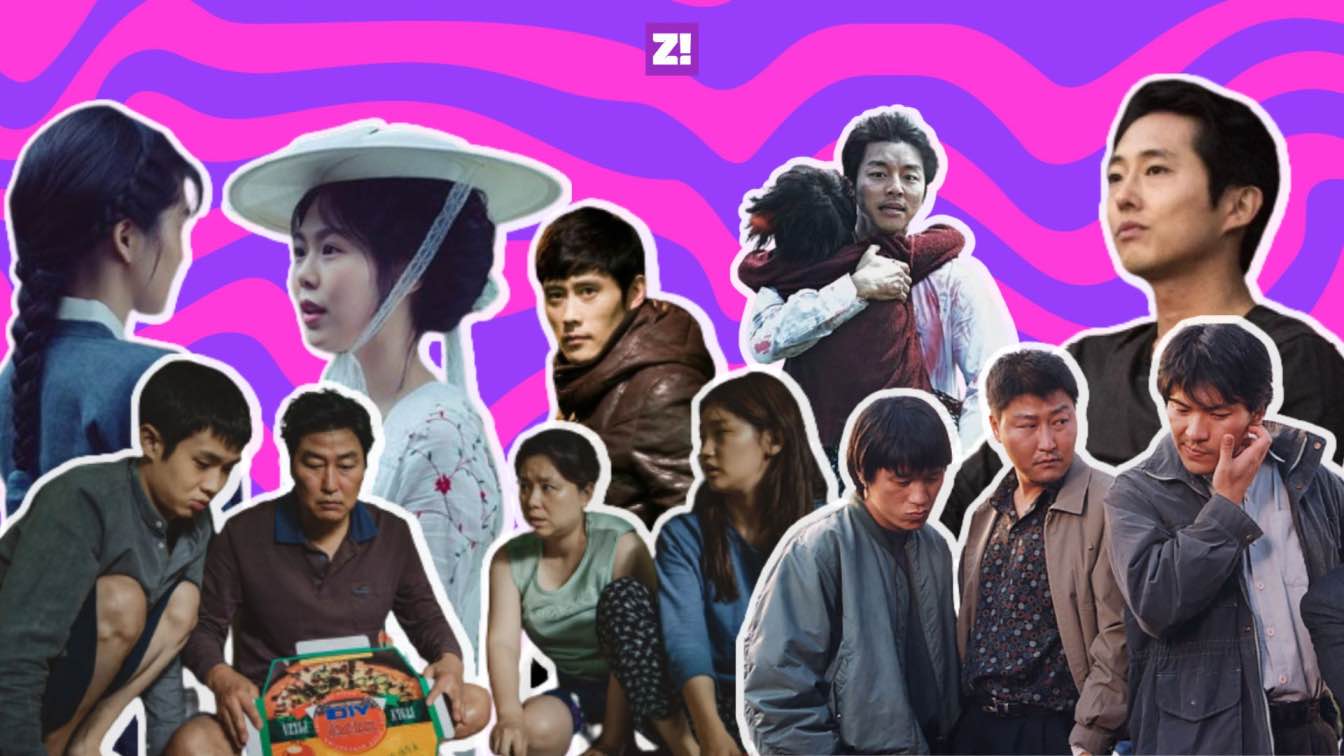What does it mean to be a man? Surely, it’s not one thing. It’s a series of little moments that add up. Man Like is a weekly Zikoko series documenting these moments to see how it adds up. It’s a series for men by men, talking about men’s issues. We try to understand what it means to “be a man” from the perspective of the subject of the week.
While you may not recognise Etubi Onucheyo‘s name or face, you’ve probably seen his visual art at some point. The reclusive artist is behind some the cover of our favourite albums, from Show Dem Camp’s “Clone Wars Vol. 5: The Algorhythm” to The Cavemen’s “Love and Highlife”. With a portfolio like this, I’m surprised when Etubi tells me there was a time he didn’t rate himself as an artist. So what changed?
In this episode of Man Like, he talks about what his dad did that forced him to move out, how SAPA made him man up, the one time he questioned his masculinity and how he’s turned his imposter syndrome into “conman syndrome”.

Let’s talk about your tattoos. Which one is your favourite, and why?
The most significant tattoo I have has to be a compilation of icons down my spine. These tattoos represent who I am. There’s a paper plane because I’m a dreamer, an upside-down crown showing that I’m a misunderstood king, a straw hat and robot monkey from my favourite Anime, One Piece. The last tattoo on my spine is a Latin phrase from another anime fave, Little Witch Academia, which says, “You get what you work for, not what you dream of”.
I was trying to be deep.
I’m dead. So with all these tattoos, who is Etubi?
A misunderstood dreamer trying to create dope art and do something great with his life.
How did your upbringing influence who you are today?
My childhood was complicated for a lot of reasons. My mum had been married a couple of times before, so I had a lot of half-siblings. Because of the age difference between my half brothers and me, I remember my dad did his best to shield me from them. I think he didn’t want them to influence me negatively, but it didn’t work. We didn’t care that we had different dads; we all loved each other. My siblings supported me over the years and came through for me when I least expected it. Having that kind of love in such a complicated mix has deeply impacted my life and work.
What’s the deal with your dad?
Right now, my dad and I are trying to rebuild a relationship that had deteriorated over the years. I hadn’t spoken to him in a long time, but then, this year, a friend of mine gingered me to reach out, so I did. My dad and I used to have a lot of back-and-forth arguments because he wanted me to be someone I wasn’t. He wanted me to be a teacher at some point, but it wasn’t for me.
Another thing that got to me was how he spoke about women, my mum in particular after they separated. He spent a lot of time talking about how evil women were, refusing to acknowledge that for their relationship not to have worked, he must’ve played a part in it, no matter how small. He was hurt, and instead of addressing his pain, he took it out on the people around him.
By 2017, I’d had enough, so I moved out.
Wait, what happened?
My dad lost his mum, and my immediate elder brother moved out of the country, leaving him with me at home. In retrospect, maybe I should’ve tried to see things from his point of view since we were going through all these things simultaneously. But all I felt at the time was this man was trying to frustrate and oppress me.
The final argument that eventually made me move out was the day he went into my room in my absence, and threw some of my things out.
Ah. Why?
My dad is big on going to church, and he expected me to always go with him for the first service by 7 a.m. no less. The church thing was a lot for me, so I’d go to my friend’s place on Fridays and come back home on Monday evenings to avoid church. One time, because there was a public holiday, I left my house on Thursday and didn’t return until the following Wednesday.
He didn’t say anything when I returned, but I noticed later that most of my beaded bracelets were missing. I asked him about them, and he admitted that he’d thrown them out, but not before asking if I was a cultist. Then, he started to drag my mum into the conversation. That’s when I realised maybe I wasn’t the son he wanted and I needed to give him space.
I moved out that month. My dad and I weren’t really speaking and he saw when I was leaving with my big ass box and knew it was because of the fight. I’m sure he thought I’d eventually come back. But I never did.
Even though my dad and I are back on speaking terms, we haven’t seen each other since I moved out or had an actual conversation to unpack what happened between us. It will happen in time, but I can imagine my dad’s face when he sees all my tattoos. He might have a mini-stroke. He’ll be fine las las sha.
How did your siblings react to you moving out?
Everybody kind of knew my dad and I had a rocky relationship, so it wasn’t that much of a surprise. They asked if it was what I wanted and reminded me to be safe. My brothers and sister actually asked me to come live with them. They’d always been supportive, but as a man, I wanted to try things out on my own.
What was life like after you left?
Omo, bills! But luckily for me, I moved in with a friend, so I wasn’t shouldering rent and other bills alone. I also had a small stream of income from the art I was making, so I wasn’t dying. One thing I learnt about moving out of my dad’s house though was that I enjoy my personal space.
Because I lived in a central area in Abuja, it was easy for everyone to visit me. The visits became so much that people would stop by my place to wait out traffic after work. These were my friends, but I needed time to myself and to not have unexpected visitors all the time. It eventually piled up in my mind until I lashed out at a friend who visited me unexpectedly. It affected that friendship, and I regret it. But now, I’m better at saying things as I feel them, so it doesn’t pile up in my mind.
In all of this, I’m curious about when you got your “I’m a man now” moment
My first Christmas out of my dad’s house, when I was so broke I couldn’t even afford to kill a chicken for the holidays, mehn.
Scrim
At that time, I made comics, and I’d done two graphic novels that year. I worked Mondays to Sundays. Despite all of that, I was still broke. I had to confront my imposter syndrome to realise that I’d been undervaluing myself and my work. I was working hard, but I was suffering because I wasn’t charging good money. I didn’t think I was good enough or “there” yet. Deciding to change this notion and value myself as a person, a man and creative, was a turning point for me.
My friends also helped me realise I didn’t appreciate my work. They were making big moves and working with the best brands, but they still took the time to tell me my work was good. I just had to believe it too. They saw me as an equal, and I knew I couldn’t let them down. I didn’t want to be left behind.
Why do you think you struggled with imposter syndrome?
I didn’t feel like my work was where it needed to be. I was also hungry and broke at the time, so I was taking whatever I was offered and overworking myself. We’re in Nigeria, and life is crazy, so walking away from projects because I wasn’t offered good money felt like such a huge risk. Now that I know I’m the shit, I even get to increase my rates every three months.
I’ve moved from having imposter syndrome to what I call the “conman syndrome”. So instead of thinking I’m an imposter, I tell myself I’m a conman and everybody believes I’m this great artist who deserves a ton of money. So until they catch me, this 419 will continue.
Etubi, abeg. How did you even get into making art?
Surprisingly, it was through my dad. I had plans to study economics, but he gave me the gist that economics was like maths, with a lot of “find x” and “differentiate y”, so I changed my mind sharply. He was the one who suggested art and promised to support me. I remember many of my classmates who studied fine arts, getting cut off by their parents because it was against their wishes, but my dad supported me. It’s ironic that he wanted me to have a 9-to-5 life later on. LOL.
Considering all your experiences, I’d like to know your definition of being a man
Standing on my own two feet and being free. Society is constantly telling us who we should be as men, but omo, I just want to do my own thing. Also, we’re learning new things about how men can be dustbins sometimes, so I think being a man should just mean being a good human to other people.
Has anything ever threatened your masculinity?
I remember once, I went to this party, and because I’m a playful person, some girls there started tickling me. This was in 2019, and I noticed a group of guys kept looking at me and trying to allude that I was gay. I started acting strange because I was also conscious of that label, but thinking about it now, I don’t care. Bro, it’s just tickling. We need to free ourselves from all these rules. Why would anyone be so uptight about a man getting tickled by a woman? Don’t you want a woman to tickle you? LOL.
Fair enough. So what would you say are the necessary things to lead a happy life?
Accepting that you’re not perfect. Everybody get the thing wey dey do them. It’s been great accepting my madness and knowing it’s okay. I’m not that different from everyone else.
ALSO READ: I Was Labelled Gay Before I Even Understood What It Meant — Man Like Richard Akuson




